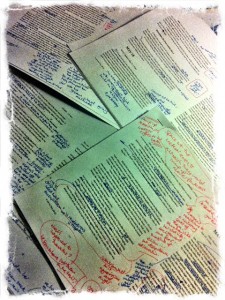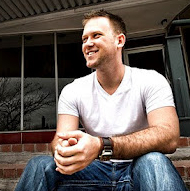I?ve just finished the second major edit of my novel Exodus, #3 in the ARKANE series. I?m now going through again, editing it on the Kindle before releasing it to beta readers.

Some of my own editing
It?s true that writing the novel is only the start of the adventure, for it?s the editing stage that can make or break the success of your book. Guest blogger Nick Thacker has some tips.?
I just finished writing a book.
Part of me is elated; ?bouncing-off-the-walls?-excited.
The other part of me knows it?s a lie?I am, after all, a pretty ?na?ve? writer?
While I?ve ?finished? writing a book (a thriller novel, to be specific), I also know that I?m nowhere near finished with the actual process of ?book writing.?
To be clear, the words are all there. The cover?s even complete, and I?ve got some Lulu-printed hardcovers and paperbacks on the way, and the Kindle version is ready-to-go on Amazon.
And I didn?t have to ?sell my soul? to get it done.
But I?m writing this post for two reasons: to talk about the next step for myself (and you, if you?re in a similar boat), and to prolong the actual taking of the next step?
What?s the next step?
To put it bluntly, it?s the rewriting process: the editing, cutting, rehashing, rewording, etc?everything that we don?t think about when we begin the rewarding and awesome journey of book writing.
Sure, I have a pretty decent vocabulary, which I think I?m able to wield with relative ease. I also pride myself at my editing/proofreading abilities?I love to spot those incorrect there, they?re, or theirs in other peoples? work.
But when I finish an article, chapter, or larger work, when that last word is placed so perfectly on the page (or screen) in front of me?I?m done. I absolutely abhor the idea of starting again. I don?t want to revisit my characters?some have died horrible, nightmarish deaths?and scenes. I don?t want to find the typos, mistakes, and misnomers that I?ve somehow let slide the first time around?not to mention the strange wording here, the odd anachronism there. I just want to upload my Kindle file and start building my blog?s readership to sell more books.
Writing, I?ve come to find out, is maybe one part actual writing?putting words on the paper?and one part (or more!) redoing everything.
Umm, we know?
Maybe I?m just too new to this art form. Maybe I just wasn?t properly forewarned. Maybe I?m actually on to something no one?s ever thought of before.
Most likely, the importance and headache of editing down, improving, and finalizing a manuscript is something I?ve just ignored since?obviously?I need to have a manuscript written first before I?m able to really edit and rework it.
Either way, I?m now starting to realize a few key points that may be of use to others looking to push through their first novel. Here are a few items that I?ve found, after penning 110,000 words, that would have helped me enormously prior to and during my writing experience:
Planning
I can?t stress this enough. Some writers are able to ?flow? in a linear way, bouncing from chapter to chapter in a seemingly effortless way. I started writing as I began the research, and I wish I?d spent 2-3 months solely researching, planning, and studying?my characters, my settings, and my ideas.
Equipment
While I?m sure it?s not impossible to write long documents in Microsoft Word, who would want to? I used a piece of software called Storyist for a brief period, mainly for its full-screen mode, until I stumbled across Scrivener (which soon released a full-screen mode as well anyway!), which made my writing experience and compilation process not only easy, but also enjoyable. To round out my equipment set up, I used Evernote for the research and planning process and always have my MacBook Pro at my side (or on my lap).
Reading material
Usually the last thing on my mind during the writing process was reading more. I was constantly working on the manuscript, reading a few similar genre thrillers, and maintaining my non-fiction reading for work. But about three days after I hit ?Compile? and prepared my book for its first print-run, I came across Dwight Swain. If you haven?t heard of him, Google his work right now. I have a copy of Techniques for the Selling Writer in front of me now, highlighted and ready for a second read-through. Honestly, it?s not just one of the best ?how to write? books out there?it may very well be one of the most outstanding ?how-to? books on the market. His timeless advice is extremely practical, easy-to-digest, and specifically geared toward fiction writers interested in commercial viability.
I?m not going to stand on a soapbox and preach the ?one true way? for writing?as with most art forms, there?s never only one route to the destination. I?m just hoping to start a dialogue with both the seasoned writers out there and the younglings like myself who are eager and willing to learn.
The secret?
What I?ve found after writing one novel, starting a second, and completing numerous nonfiction manuscripts, is that this ?last step? should actually come first.
Obviously it?s impossible to rewrite what we haven?t written yet, but what I mean is this:
Plan ahead for the rewriting process:
- Plan ahead by outlining and layout out your novel well the first time.
- Plan ahead for the extra time it will take between going back and forth with an agent, editor, or publisher.
- Plan ahead for the marketing steps you?ll immediately want to take after you write ?The End.?
- Plan ahead for the balance between starting to promote and finishing up your WIP manuscript.
Most new writers know they?re ?supposed? to rewrite at least once or twice. I was one of these ?in-the-know? people, but yet I somehow thought that my writing was above this, and I didn?t need to rewrite.
Thankfully, I had absolutely no momentum built when I finished the first draft, so there was no eager tempting to send my masterpiece out into the world, uncut and unfinished. I threw it in a drawer and then started researching the marketing and promotional aspects of my upcoming book launch?eventually to realize that a couple rewrites were more than necessary!
What do you think?
My experience and takeaways might help someone structure, plan, and execute the writing of their own masterpiece, but for now I?m happy enough to post this, hear your thoughts, and join in the discussion!
Have you done a full rewrite, or is your planning process such that you don?t feel you need to rewrite at all? Let us know in the comments below.
 About the Author
About the Author
Nick Thacker is a writer from Texas, and he writes to help writers, bloggers, and pretty much anyone who wants to hack their life! Check him out on his website, where he talks about?how to write, and be sure to grab his new book, Welcome Home: The Author?s Guide to Building A Marketing Home Base. Also, be sure to grab the newsletter!
No related posts.
Related posts brought to you by Yet Another Related Posts Plugin.
Source: http://www.thecreativepenn.com/2012/10/25/novel-editing/
gavin degraw alec time 100 bob beckel anna paquin warren buffett 2012 nfl schedule
No comments:
Post a Comment
Note: Only a member of this blog may post a comment.